
AI’s Leap Towards Human-Level Language SkillsAI’s Leap Towards Human-Level Language Skills Natural language processing (NLP) has long been a cornerstone of artificial intelligence (AI) research. In recent years, AI systems have made remarkable progress in understanding and generating human language, taking a significant leap towards achieving human-level language skills. Advancements in Language Models One of the key drivers of this progress has been the development of advanced language models such as GPT-3 and LaMDA. These models are trained on massive datasets of text, enabling them to learn the intricacies of human language, including grammar, semantics, and context. These models can perform various language-related tasks, including: * Text generation: Creating coherent and natural-sounding text, including stories, essays, and even poetry. * Language translation: Translating text from one language to another with high accuracy and fluency. * Question answering: Providing concise and informative answers to questions asked in natural language. * Sentiment analysis: Understanding the emotional tone and sentiment expressed in written text. Bridging the Human-AI Gap AI systems with human-level language skills have the potential to revolutionize human-computer interaction. They can: * Enhance communication: Enable more natural and intuitive conversations between humans and machines. * Improve accessibility: Make digital content accessible to individuals with language barriers or literacy challenges. * Provide personalized assistance: Offer tailored information, recommendations, and support based on individual language preferences. Remaining Challenges While AI systems have achieved impressive progress in language skills, they still face certain challenges: * Understanding context: Fully comprehending the nuances and complexities of human language, including sarcasm, irony, and cultural references. * Reasoning and inference: Making logical deductions and inferences based on language input. * Creativity and originality: Generating truly novel and unique language content that goes beyond imitation. Ethical Considerations As AI systems approach human-level language capabilities, ethical considerations become increasingly important: * Bias and discrimination: Ensuring that language models are trained on inclusive datasets to mitigate potential biases. * Privacy and authenticity: Protecting user data and preventing the spread of misinformation or deepfakes. * Job displacement: Considering the potential impact on individuals working in language-related professions. Conclusion AI’s leap towards human-level language skills is a transformative advancement that brings both opportunities and challenges. By addressing remaining limitations and navigating ethical considerations, we can harness the potential of these systems to enhance communication, improve accessibility, and create more personalized and engaging digital experiences.
Posted inNews